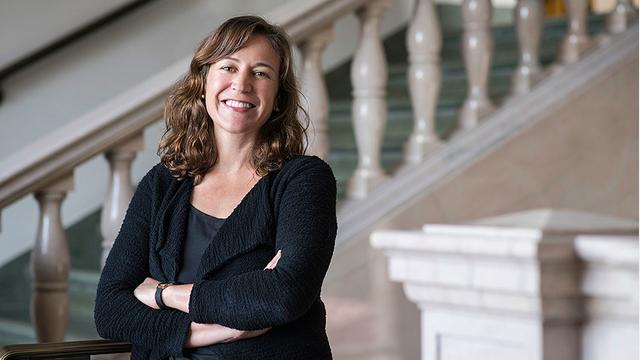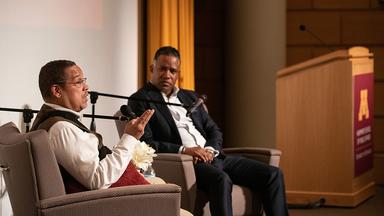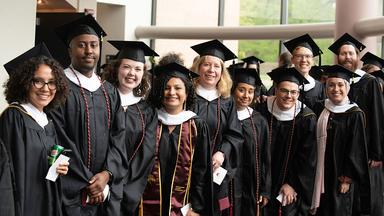Humphrey School Associate Professor Bonnie Keeler has been named to the U.S. Environmental Protection Agency's Board of Scientific Counselors (BOSC), as a member of its Social and Community Science Subcommittee. Keeler’s three-year term began in April.
The BOSC is a distinguished body of scientists and engineers who are recognized experts in their respective fields. They represent academia, industry, government, environmental and human health care professions, research organizations, and other relevant entities.
Keeler is co-director of the Humphrey School’s Center on Science, Technology, and Environmental Policy (C-STEP). Her research focuses on the intersection of sustainability science and environmental economics. She has particular expertise in water policy.
“I have been active in state water policy for many years, and one of my professional goals is to have a greater impact on federal environmental policy,” Keeler said. “The Biden administration's focus on science-based policy making and environmental justice provides an additional incentive to get involved at this time.”
With this appointment, Keeler follows in the footsteps of her mentor Deborah Swackhamer, former professor at the Humphrey School and well-known environmental scientist who chaired the BOSC from 2015 to 2017. Swackhamer died in April 2021.
“Deb Swackhamer was one of my role models,” said Keeler. “She was widely recognized for her leadership in water policy and her tireless advocacy for science.”
Swackhamer was removed as the BOSC chair in 2017 after refusing a request from EPA leaders to change congressional testimony she was preparing to deliver about what she characterized as the Trump administration’s “meddling” with EPA’s scientific panels.
“Deb demonstrated how scientific rigor and credibility could be aligned with policy and advocacy to enact change at local to national scales,” said Keeler. “I’ve been inspired by her dedication to science as a public good and an essential component of effective state and federal institutions. It's meaningful to me to be able to continue to represent the University and the Humphrey School in this capacity.”
We asked Keeler to describe the importance of the BOSC and what issues she expects to address as a member.
What is the purpose of the BOSC?
The role of the board is to support the EPA's Office of Research and Development, as well as to be responsive to the research needs and concerns of state, tribal, and local organizations. The BOSC includes an executive committee and two subcommittees that reflect the priorities of the Biden administration. The subcommittee I am serving on is focused on social and community science, and the other one is on climate change.
What are your responsibilities as a member of the board?
BOSC members serve as trusted advisors on issues of concern related to EPA research priorities or policies. EPA leadership poses "challenge questions" to the BOSC; BOSC members review data, reports, and documentation; discuss environmental and social implications of proposed rules and regulations; and provide expert opinion to guide EPA's research investments and priorities. We communicate our results in reports or letters that are approved by the BOSC executive committee and then submitted to EPA leadership.
What topics will you handle on the Social and Community Science subcommittee?
Our charge will be to advise EPA on outreach and engagement strategies with affected communities; for example, ideas on how to reach communities that might not be aware of PFAS (per- and polyfluoroalkyl substances) contamination. [PFAS are sometimes referred to as ‘forever chemicals’ because they are found in low levels all over the world and break down very slowly over time. Their long-term health effects are still unclear.]
The subcommittee will also advise EPA on how to be more systematic in its strategies for community engagement and social science data gathering, and explore ways to build trust with stakeholders affected by pollution or other environmental harms – including the public, community groups, industry owners and operators.
How will this experience benefit your students and the Humphrey School?
I have been active in state water policy for many years and recently began more work on federal environmental policy. I'm learning so much about how agencies make decisions, and the challenges of translating science into actionable changes that improve the environment and human health.
I'm excited to bring first-hand experience in federal science policy into the classroom, to expand the professional networks I can offer to students, and to get new ideas for impactful research on community and social science.
In addition, EPA's current research priorities align with many areas of expertise in the STEP community, including nutrient pollution, climate change resilience, and environmental and social justice. I'm looking forward to aligning our STEP area capacities to better address the energy and environmental problems of greatest concern and advance EPA's mission to protect human health and the environment.


